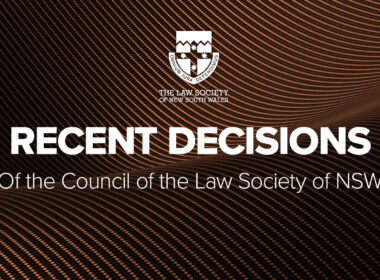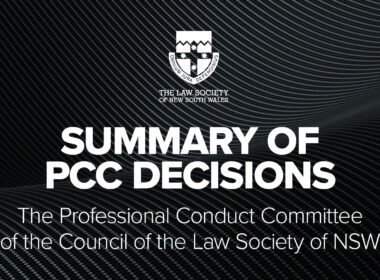Following the passage of the Anti-Money Laundering and Counter-Terrorism Financing Amendment Act 2024 late last year, the Law Society of NSW has increased efforts in educating the profession about the AML/CTF reforms (known as Tranche 2 reforms), and what solicitors can do now to ready their practice for 1 July 2026, when obligations under the AML/CTF Act will commence for certain solicitors and law practices.
The Law Society of NSW has prepared the below FAQs, which outline key aspects
of the AML/CTF reforms (known as Tranche 2 reforms) for NSW solicitors.
What are “Tranche 2” AML Reforms?
“Tranche 2 reforms” refers to the Commonwealth Government’s expansion of Australia’s AML/CTF regime to include gatekeeper professions – certain professional service providers such as lawyers, conveyancers, accountants, real estate agents and precious stone and metal dealers – that provide a “designated service”, as defined by the amended AML/CTF legislation.
Why are AML/CTF reforms happening?
The Commonwealth Government wants to strengthen Australia’s AML/CTF regime so that it continues to effectively deter, detect and disrupt money laundering, terrorism financing and proliferation financing.
The regime is based on international standards set by the global financial crime watchdog, the Financial Action Task Force.
What legislation captures the reforms?
- AML/CTF Act
- AML Rules (expected to be finalised in July 2025)
- AUSTRAC is currently consulting with industry on Guidance that will provide practical detail on AUSTRAC’s compliance expectations for those who fall within the amended regime, including lawyers who provide a designated service. This will include Core Guidance (expected to be finalised in September 2025) and Sector-Specific Guidance (expected to be finalised in January 2026).
Who will have new reporting obligations under the AML Reforms?
A law practice that provides one or more designated services will be considered a “reporting entity” and have obligations under the new AML/CTF Act. AUSTRAC have developed a tool to help you determine whether you provide a designated service.
What is a ‘Designated Service’?
Designated Services are defined under section 6 of the amended AML/CTF Act.
They include certain services, such as assisting clients to:
- buy, sell or transfer real estate,
- buy, sell or transfer legal entities,
- receive, hold, control or manage their funds and/or property, for example, money, accounts, securities or assets,
- sell or transfer a shelf company,
- carry out some transactional work, including equity and debt financing, and
- create or restructure a legal entity or legal arrangement.
As noted above, AUSTRAC have also created a tool to help users determine if they will be regulated.
I’m a solicitor who provides a designated service. When will I become a reporting entity under the AML/CTF Act?
You will become a reporting entity on 31 March 2026. After this date, you can enrol with AUSTRAC (see FAQ below on ‘when can I enrol?’).
I’m going to be regulated under the new AML/CTF Act. When do my AML/CTF obligations commence?
1 July 2026 (a summary of your AML/CTF obligations is below).
I’m still not clear as to whether I provide a designated service. What should I do?
AUSTRAC Core Guidance is anticipated to provide further details on what AUSTRAC will consider ‘out of scope’. In the meantime, we encourage you to familiarise yourself with the AML/CTF regime and prepare for compliance.
The Law Society has created a suite of complimentary resources to assist you to prepare for the reforms, which can all be located on our AML/CTF Hub.
It is also a good idea to refer to AUSTRAC’s website, which has information to help reporting entities navigate the reforms.
What will reporting entities need to do?
Generally, reporting entities will need to:
- Enrol with AUSTRAC
- Conduct customer due diligence
- Develop and maintain an AML/CTF Program
- Report certain transactions and suspicious activity
- Keep records
- Designate someone as their AML Compliance Officer (AMLCO).
You can find more details on AUSTRAC’s website.
When can I enrol with AUSTRAC?
You can enrol with AUSTRAC after 31 March 2026.
Once you have enrolled, you will be given an AUSTRAC online account.
You must enrol with AUSTRAC within 28 days of providing a designated service.
For most solicitors, this means you will need to enrol with AUSTRAC by 29 July 2026.
If you know you provide a designated service, we recommend you enrol early so you can receive relevant information from AUSTRAC.
Are there any special requirements for an AMLCO?
The AMLCO has to:
- be an Australian resident,
- be a fit and proper person
- be employed or engaged at management level, and
- have sufficient authority, independence and access to information and resources to undertake their role effectively.
The AMLCO must, among other things, oversee and coordinate:
- the practice’s day-to-day compliance with the AML legislative scheme, and
- the effective operation of, and compliance with the practice’s AML/CTF policies. .
The AMLCO can be employed internally or be otherwise engaged by the law practice. They can also have other roles.
I am a sole practitioner. Do I need an AMLCO, and if so, can it be me?
Yes, if you provide a designated service, you will need to designate an AMLCO. If you are a sole practitioner, or in senior management position at your practice, it can be you.
See FAQ 11 for more information on what is required of an AMLCO.
Where should I start if I’m completely new to this?
There are several places we recommend you go to get up-to-date on the reforms.
- AUSTRAC’s website, which has information about the AML/CTF reforms
- Explore our complimentary LawInform courses on AML/CTF. We particularly recommend our most recent offering, ‘Preparing your practice for Australia’s AML/CTF regime’.
You can claim CPD points on all of our LawInform courses.
Our AML/CTF Hub has a suite of relevant information, including resources, links to background papers, current legislation and complimentary AML/CTF CPD courses.
What is a ‘Starter Kit’?
To support small businesses, AUSTRAC is currently developing an AML/CTF Starter Program Kit for small businesses. According to AUSTRAC, the Kits will provide an AML/CTF program for a typical low complexity small business.
If you fit the profile of a “small business”, these Starter Program Kits will provide you with an AML Program for you to use for your practice. You will still need to tailor and implement it for it to be considered effective.
If you fit the profile for a small business, use of the AUSTRAC Starter Program Kit is not mandatory, but it is recommended.
The Kits are expected to be available in late 2025, together with a definition of “small business”.
We will continue to provide you with more information as it becomes available to us.
Do I have to engage an external entity to help me comply with AML?
No. The AML/CTF reforms do not require you to engage an external entity.
While you can outsource your compliance obligations, you cannot outsource your liability under the AML/CTF Act.
What is an AML solutions or RegTech provider?
There are private entities that provide services to assist reporting entities to comply with their AML/CTF obligations. These are often referred to as ‘AML solution providers’ or ‘RegTech’. Often, these providers use technology to assist with compliance.
If you do intend to engage an AML or other solutions provider to assist you with compliance, you may wish to refer to AUSTRAC’s Guidance for Engaging a RegTech.
Can I outsource any of my AML obligations?
Yes, you can. However, while you can outsource some of your AML/CTF obligations, you cannot outsource your liability for them. This means that you will remain ultimately responsible for compliance with the AML/CTF regime.
For example, you may want to outsource certain functions relating to your compliance with the AML/CTF Act, such as undertake client due diligence or employee due diligence. However, you will remain liable to AUSTRAC if that work is not undertaken properly.
How do the reforms impact legal professional privilege?
The AML/CTF Act contains protections for legal professional privilege.
AUSTRAC has stated that the “common law doctrine of legal professional privilege will remain unchanged under the reformed laws”.
AUSTRAC has also stated that “the process for asserting privilege involves providing a dedicated legal professional privilege form in lieu of the requested information” and that this form will be available at a later date.
Please see AUSTRAC’s webpage, Summary of AML/CTF obligations for tranche 2 entities for more information.
We will continue to provide you with more information as this becomes available to us.
How do the reforms impact confidentiality?
The Australian Solicitors’ Conduct Rules, in particular rule 9.22, allow a solicitor to disclose information which is confidential to a client if the solicitor is compelled by law to disclose it.
When should I start preparing for compliance?
We strongly recommend that you start preparing now.
The following resources may be particularly helpful:
- AUSTRAC’s website, which has information about the AML/CTF reforms,, which has information about the AML/CTF reforms
- Our complimentary, CPD point claimable, LawInform courses on AML/CTF
- Our AML/CTF Hub, which contains a suite of AML/CTF resources.
Can I ask someone a question?
Yes! Please contact the Law Society Professional Support Unit for guidance on either amlctf@lawsociety.com.au or (02) 9926 0249.
In addition, you may wish to contact AUSTRAC on 1300 021 037, or submit a query online to AUSTRAC’s Contact Centre.
Carol Prasad is a Professional Support Solicitor (AML) at the Law Society of NSW. She is an experienced banking and financial services lawyer with experience gained at a number of Australia’s premier financial institutions, leading law firms and a Big 4 accounting firm. Her background includes experience in Anti-Money Laundering and Counter-Terrorism Financing, sanctions, consumer credit, privacy and alternative dispute resolution. She brings with her more than 15 years’ experience.




